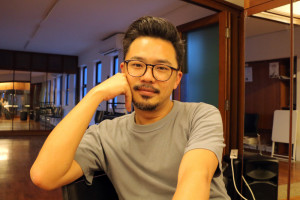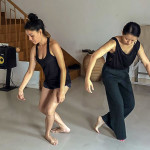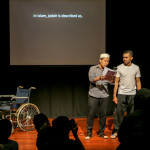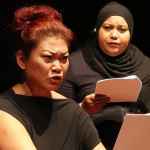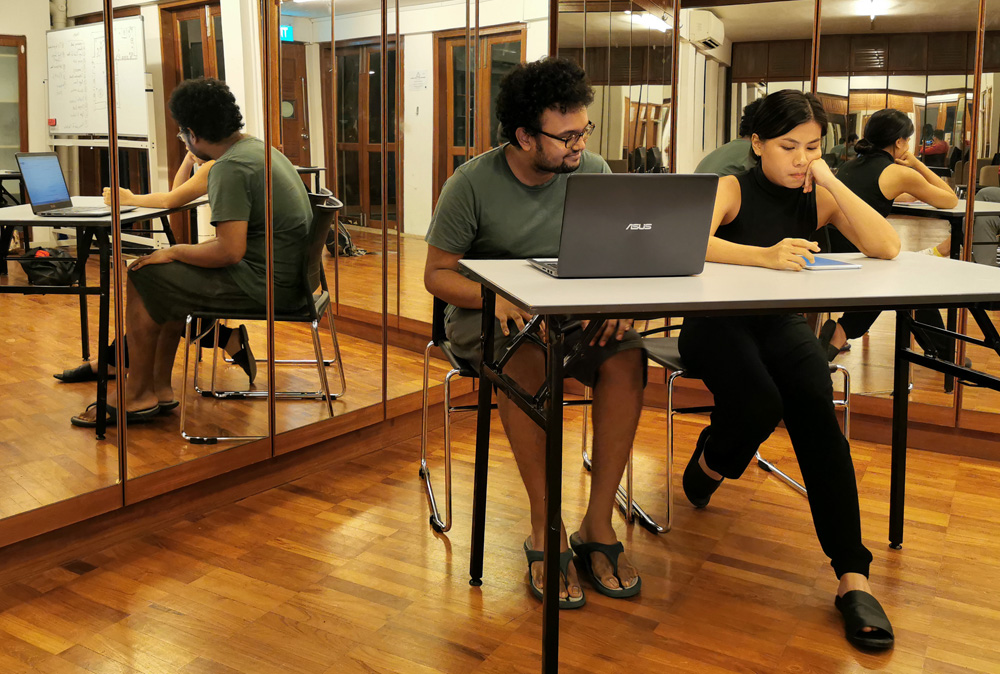
Pritthijit Dastidar and Vanessa Toh in a rehearsal for Dating Sim (Beta). (Image: Attempts)
“The more I write, the more I have to write!” theatre-maker and game designer Rei Poh exclaims. It is still early on in the process, but Rei’s script for his upcoming work, Dating Sim (Beta), has already amassed a hefty count of a hundred pages.
His collective, Attempts, is presenting Dating Sim (Beta) at Late Night Texting on 30 and 31 August. It is a participatory theatrical experience, in which a fictional conglomerate named ‘ARC’ is beta-testing ‘Mate-Match’, an algorithm designed to find perfect matches for everyone. In real life, Rei is also beta-testing the combination of an interactive dating simulation game and a theatrical work in Dating Sim (Beta) – audience-participants will play as a heterosexual man, who has to choose between two female characters.
To illustrate his writing process, Rei mimes a single branch splitting into two more branches and so on. The result is a tree-like game structure that will lead down different paths depending on participants’ collective choices.
Despite his overwhelming page count, he is thrilled by the insight dating simulations can offer to real relationships. “Dating simulations [are based on] gender roles in dating,” he says. He recalls his own experience playing dating simulations, usually role-playing as a male Japanese high-schooler chasing archetypal girls. “You have to remember what kind of girls they are […], memorise what their likings are, [and] answer questions correctly in hopes of dating them,” he says of the game genre.
Dating simulations first appeared in the 1980s in Japan, along with the rise of personal computers. Players often assume a male avatar and have interactions with attractive girls; these interactions can even be sexually explicit or violent. Over the years, dating simulations have evolved to accommodate every romantic whim and fancy: Dream Daddy lets you play as a gay dad romancing other hot dads, and, stranger yet, Hatoful Boyfriend lets you date pigeons!
But even in these light-hearted spin-offs, certain “rules” still hold true as they do in real-life dating. Rei points out that these are gendered, heterosexual expectations in dating, such as men having to pay for dates, or women being obligated to entertain men who are nice to them.
In order to overturn these androcentric narratives, Dating Sim (Beta) will feature a stronger female perspective. “[Unlike] other games, you are supposed to focus on the two female characters, rather than on your experience as a [male character],” the self-professed feminist artist says. “It is my way of applying feminism into the game to investigate where the power balance is and where the power is being re-distributed.”
Rei is also looking to redress the power imbalance in a conventional theatrical encounter. He uses the term “对立” [Mandarin for “conflict, antagonism”] to describe the relationship between the audience and the artist, wherein audiences often feel intimidated or disempowered when they do not understand the artist’s work. “We want to get on the same level as the artist,” he says. “When people don’t [understand a piece of theatre], they feel like they’re idiots.”
But he hopes that power imbalance will be shifted in Dating Sim (Beta), as participants can choose how the experience will unfold. “It’s not about me, [the artist]. It’s about us,” Rei says. “Hopefully, [audiences] will come in and feel like we are doing something together.”
Rei is no stranger to audience participation in theatre. His collective’s inaugural production, titled Attempts: Singapore, was staged at the 2018 M1 Singapore Fringe Festival. Attempts: Singapore was an immersive theatrical experience that tasked audience-participants with reconstructing the identity of a woman named Anne based on a series of clues.
He has also been involved in forum theatre, which encourages audiences to intervene and change the story that unfolds onstage. He recently directed the forum theatre piece, Exit, a play that explores end-of-life issues.
Audience participation is precisely why Rei is drawn to video games in his theatre-making practice: “I [turned to] video games because they consider the player’s experience more than anything.” For him, video games focus on the players’ decision-making process and their direct action. “That excites me,” he confesses. “Games are the best way to look at how the world works.”
With its ambitions to challenge gender norms and empower audiences, Dating Sims (Beta) is an exciting example of how games and theatre are, indeed, a match made in heaven.
By Lee Shu Yu
Published on 31 July 2019
Dating Sim (Beta) will be playing at Late-Night Texting on 30 & 31 August 2019. Click here for more information.
Update (1 August 2019): Rewrote third sentence of paragraph 2 for clarity on Rei beta-testing the dating simulation game format in a theatrical setting.

